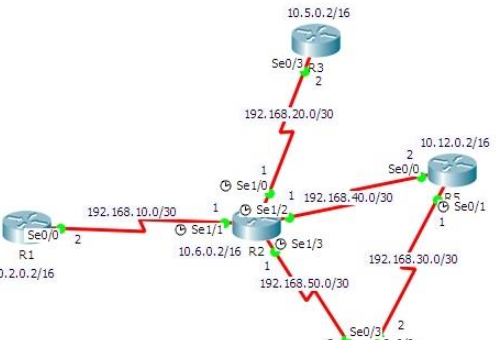如何分析EIGRP協議
- WBOYWBOYWBOYWBOYWBOYWBOYWBOYWBOYWBOYWBOYWBOYWBOYWB轉載
- 2023-05-19 21:57:001711瀏覽
1、EIGRP協定簡述
EIGRP(Enhanced Inerior Gateway Routing Protocol,增強型內部網關路由協定)是一個平衡混合型路由協議,它融合了距離向量和鏈路狀態兩種路由協定的優點,也是CISCO的私人協定。
EIGRP是一個有效率的路由協議,它的特點是:
#透過發送和接收Hello套件來建立和維持鄰居的關係,並交換路由資訊;
採用組播(224.0.0.10)或單播進行路由更新;
EIGRP的管理距離為90和170;
採用觸發更新,減少頻寬佔用;
-
支援可變長子網路遮罩(VLSM),預設開啟自動匯總功能;
支援IP、IPX、和Apple Talk等多種網路層協定;
#對每種網路協議,EIGRP多維持獨立的鄰居表、拓撲表和路由表;
EIGRP採用Diffusing Upadte演算法(DUAL)來實現快速收斂並確保沒有路由環路;
儲存整個網路拓撲結構的信息,一邊快速適應網路變化;
支援等價和非等價的負載平衡;
使用可靠傳輸協定(RTP)確保路由資訊傳輸的可靠性;
無縫連接資料鏈結層協定與拓樸結構,EIGRP不要求對OSI參考模型的2層協定進行配置;
2、實驗目的
#簡單理解EIGRP以下二個基礎知識點。
瞭解鄰居表、拓樸表以及路由表;
#EIGRP度量值的計算方法;
3、拓樸圖

兩台相鄰的路由器要建立起鄰接關係需要滿足兩個條件,為相同的AS號和相符的K值。以R2為例,你可以使用「Show ip protocols」指令來檢視
R2#show ip protocols
Routing Protocol is "eigrp 200 "
#Outgoing update filter list for all interfaces is not set
Incoming update filter list for all interfaces is not set
##Incoming update filter list for all interfaces is not set
##Incoming update filter list for all interfaces is not set
Default networks flagged in outgoing updates
Default#networks accepted from#uping updates ##EIGRP metric weight K1=1, K2=0, K3=1, K4=0, K5=0
EIGRP maximum hopcount 100
EIGRP maximum metric variance 1
Redistributing: eigrp 200
Automatic network summarization is not in effect
Maximum path: 4
Routing for Networks:
################################################################################################################. ###192.168.20.0######192.168.40.0######192.168.50.0######0.0.0.0######Routing Information Sources:####0.0.0.0######Routing Information Gates: #way Distance Last Update######192.168.10.2 地 356798######21 382527######21 418109### ###Distance: internal 90 external 170 ######由於目前最大允許4條線路負載平衡,若路由器允許可繼續增加線路,可用maximum-paths *來修改數量(*代表數量單位)。此外,可以注意到以紅色字型標示的“eigrp 200”,它表示目前使用的EIGRP自主系統號碼為200######EIGRP metric weight K1=1, K2=0, K3=1, K4= 0, K5=0則為K值,其意義如下:######K1代表頻寬######K2代表負載######K3代表延時######K4和K5代表可靠性###預設情況下EIGRP只使用了頻寬和負載為度量值計算參數。若要修改K值可用metric weights tos k1 k2 k3 k4 k5指令,其中tos被用作服務品質區分服務等級,0為不啟用,1為啟用。
(1)、鄰居表
R2#show ip eigrp neighbors
IP-EIGRP neighbors for process 100
#H Address Interface Hold Uptime SRTT RTO Q Seq
Cnt Num
0 192.168.10.2 Se1/1 12 00:11:47 40 12 00:11:47 40 1000#60 #1 192.168.20.2 Se1/0 12 00:11:20 40 1000 0 80# ##20 192.168. 54 40 1000 0 91
3 192.168. 50.2 Se1/3 14 00:10:19 40 1000 0 94
「H」表示鄰居被學到的先後順序,0是最早學習到的鄰居;
#「H」表示鄰居被學到的先後順序,0是最先學到的鄰居;#」#」#N#Address#是鄰居路由介面IP;「Interface」是本地路由和這個鄰居相連的介面;「Hold」是目前的保持時間,預設15秒,是遞減的數值; 「Uptime」是鄰居進入鄰居表到目前經過了多久;「SRTT」是指正常往返時間,它以毫秒計算訊息在路由器間傳送的平均往返時間的測量;「RTO」是指確定重傳間隔值;「Q」是指佇列計數,列是發送佇列中等待封包數。此數值若高於0說明連結中有擁塞;##(2)、路由表R2#show ip route
Codes: C - connected, S - static, I - IGRP, R - RIP, M - mobile, B - BGPD - EIGRP, EX - EIGRP external, O - OSPF, IA - OSPF inter area
#N1 - OSPF NSSA external type 1, N2 - OSPF NSSA external type 2
E1 - OSPF external type 1, E2 - OSPF external type 2, E - EGP
i - IS## -IS, L1 - IS-IS level-1, L2 - IS-IS level-2, ia - IS-IS inter area
* - candidate default, U - per-user static route, o - ODR
P - periodic downloaded static route
##Gateway of last resort is not set10.0.0.0/16 is subnetted, 5 0.0 [90/20640000] via 192.168.10.2, 00:13:00, Serial1/1D 會:48, Serial1/0C 10.6.0.0 is directly connected, Loopback0D 0.2, 00:12:23, Serial1/3D 10.12.0.0 [90/20640000] via 192.168.40.2, 00:12:35, Serial1/2192.168.10.0/30 is subnetted, 111 92.168.10.0 is directly connected, Serial1/1#192.168.20.0/30 is subnetted, 1 subnetsC 192.168.20. 0/30 is subnetted, 1 subnetsD 192.168.30.0 [90/21024000] via 192.168.40.2, 00:105000] via 192.168.40.2, 00:1013221202122120212021212221221222222222#2# 2.168.50.2, 00 。 50.0 。 00:15:00, Null0",是一條自動匯總產生的路由,EIGRP和RIP預設都在主網邊界自動匯總,而不同的是EIGRP會在本地產生一條自動匯總後的路由,目標指向空接口( Null0)發往空介面的資料會被丟棄。每條鏈路都會有自動匯總記錄,從而有效地避免路由環路的產生。不必使用自動匯總功能,可以透過取消no auto-summary來實現。D 192.168.30.0 [90/21024000] via 192.168.40.2, 00:12:35, Serial1/2這是一條透過EIGRP學到的最終路由,D代表是透過EIGRP學到的,可以看到192.116892.116 .30.0/30這條連結是被匯總得來的,[90/21024000]中的90是EIGRP預設的管理距離,後面是度量值。可以透過R4或R5中的任何一個路由器到達192.168.30.0/30這條連結。
(3)、拓樸表
R2#show ip eigrp topology
IP-EIGRP Topology Table for AS 200
#Codes: P - Passive, A - Active, U - Update, Q - Query, R - Reply,
r - Reply status
P 10.2.0.0/16, 1 successors, FD is 20640000
#via 192.168.10.2 (20640000/128256), Serial1/1
P 10.5.0.0/16, 1 successors, FD is 20640000
via 192.168.20116862020
#via 192.168.2012,01262012,01620201202012,012012,012,012,0162. /0P 10.6.0.0/16, 1 successors, FD is 128256via Connected, Loopback0P 10.11.0.0/16, 1 success0P 10.11.0.0/16, 1 success0P 10.11.0.0/16, 1 successors, FD020206400200640020 via 192.168.50.2 (20640000/128256), Serial1/3via 192.168.40.2 (21152000/2297856), Serial1/2##1. , 1 successors, FD is 20640000via 192.168.40.2 (20640000/128256), Serial1/2via 192.168.50.2 (2115200862#1520085,#15250.2 (211520086)#15250.2 (211520086)# #P 192.168.10.0/30, 1 successors, FD is 20512000via Connected, Serial1/1P 192.168.20.0/30, 1 successors, 192.168.20.0/30, 1 successors, 0FD1 #via Connected, Serial1/0P 192.168.30.0/30, 2 successors, FD is 21024000via 192.168.40.2 (21024000/216985. #via 192.168.50.2 (21024000/2169856), Serial1/3P 192.168.40.0/30, 1 successors, FD is 20512000#via 1 successors, FD is 20512000
#via 1 success #P 192.168.50.0/30, 1 successors, FD is 20512000via Connected, Serial1/3其中P表示被動路由,即路由是穩定可用的。 Successors是到達遠端網路的主要路由,對任何特定的路由可以有多達標4個後繼路由。 例如:192.168.10.0/30, 1 successors,為去往192.168.10.0/30的最佳路徑,FD為可行距離。(4)、EIGRP度量值的計算方法
EIGRP透過組合頻寬、延遲、可靠性和負載等因素的複合度量值計算到目的位址的最佳路徑。如果K1、K2、K3、K4、K5都不為0,則可使用下列公式計算複合度量值:Metric=[K1*Bandwidth (K2*Bandwidth)/(256-Load) K3* Delay]*[K5/(Reliability K4)]
其中K1影響的是頻寬(Bandwidth),K2影響的是負載(Load),K3影響的是延遲(Delay),K4和K5影響的是可靠性(Reliability);一般情況下Cisco路由器只使用K1和K3來進行複合度量值的計算,所以公式同樣可以使用如下公式:重寫後的句子: The metric is calculated as 256 times the sum of (10000M divided by the minimum link bandwidth between the source and destination, plus the sum of all link delays between the source and destination, plus the sum of all link delays between the source and destination, plus the sum of all link delays between the source and destination divided 10)。目的之間最低鏈路頻寬,單位是M;源和目的之間所有鏈路延時總和,單位是微秒(usec);那麼為什麼我要用延時總和除以10,那是因為EIGRP度量值計算中是使用10微秒作為單位來計算的。 下面我們來看看實驗,例如要計算R2到R1的loopback0介面的複合度量值,要怎麼計算? 首先我們要注意R2到R1的loopback0介面的度量值,要使用R2向R1的loopback0介面方向的出接口的頻寬和延遲作為參數來計算:R2# show int se1/1Serial1/1 is up, line protocol is up (connected)Hardware is HD64570Internet address is 192.168.10.1/30Internet address is 192.168.10.1/30
MTU 1500 bytes, BW 128 Kbit, DLY 20000 usec,
如上可查看到R2的Serial 1/1介面參數為BW頻寬等0.128M,延時為20000微秒。
R1#show int loopback0
Loopback0 is up, line protocol is up (connected)
Hardware is Loopback
Internet address is 10.2.0.2/ 16
MTU 1514 bytes, BW 8000000 Kbit, DLY 5000 usec,
如上為R1的loopback0介面的參數,其頻寬為8000M,延時為5000微秒。
那麼我來根據公式「重寫後的句子: The metric is calculated as 256 times the sum of (10000M divided by the minimum link bandwidth between the source and destination, plus the sum of all link delays between the source and destination, plus the sum of all link delays between the source and destination, destination, 120).往R1的loopback0接口,最低鏈路頻寬是0.128M,延時總和是Serial1/1的延時R1的loopback0接口的延時=20000 5000,把它代入公式計算:
[10000/ R2的serial1/1介面頻寬(單位M) (R2的serial1/1介面延遲R1的loopback0介面延遲)/10]*256
即[10000/0.128 (20000 5000)/10] *256
[78125 2500]*256=20640000
#我們來驗證一下,R2去到R1的loopback0埠
R2#show ip eigrp topology
IP-EIGRP Topology Table for AS 200
Codes: P - Passive, A - Active, U - Update, Q - Query, R - Reply,
#r - Reply status
P 10.2.0.0/16, 1 successors, FD is 20640000
via 192.168.10.2 (20640000/128256), Serial1/10.2 (20640000/128256), Serial1/1
#P 10.5.0.0/16,1 個後繼,FD 為20640000
via 192.168.20.2 (20640000/128256),Serial1/0
P 10.6.0.個後繼,FD 為128256
via Connected,Loopback0
P 10.11.0.0/16,1 個後繼者,FD 為20640000
via 192.168.50.206400 128256),Serial1 /3
via 192.168.40.2(21152000/2297856),Serial1/2
#P 10.12.0.0/16,1個後繼,為20640FD0
########################################################################################################440 #via 192.168.40.2 (20640000/128256), Serial1/2######via 192.168.50.2 (21152000/2297856), Serial1/30.2 (21152000/2297856), Serial1/3####P 192168.19621212####P 192. ,FD 為20512000### ###via Connected,Serial1/1######P 192.168.20.0/30,1 個後繼,FD 為20512000######via Connected,Serial1/0## ####P 192.168.30.0 /30,2個後繼者,FD為21024000######via 192.168.40.2 (21024000/2169856), Serial1/2###2#via 192.10501940. /2169856), Serial1/3### ###P 192.168.40.0/30,1 個後繼,FD 為20512000######via Connected,Serial1/2######P 192.168.500. 30,1 個後繼,FD 為20512000### ###透過連接、串列 1/3###以上是如何分析EIGRP協議的詳細內容。更多資訊請關注PHP中文網其他相關文章!

